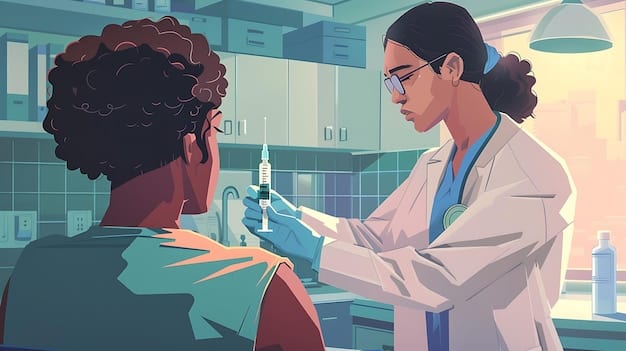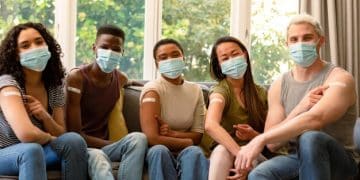The Latest Research on Cancer Prevention: Reduce Your Risk

The latest research on cancer prevention emphasizes lifestyle modifications like diet, exercise, and avoiding tobacco, alongside screenings and vaccinations, to significantly reduce the risk of developing various cancers.
Cancer remains a significant health challenge, but the latest research on cancer prevention offers hope and actionable strategies. Understanding these advancements is crucial for making informed decisions about your health.
This article explores the latest research on cancer prevention, providing practical steps you can take to reduce your risk and empower yourself with knowledge. We aim to present this information in an accessible and engaging manner, helping you navigate the complexities of cancer prevention.
Understanding the Landscape of Cancer Prevention
Cancer prevention is a multifaceted field that encompasses various strategies aimed at reducing the incidence of cancer. It’s not just about avoiding risk factors; it’s about actively promoting health and well-being.
The Role of Genetics and Environment
While genetics play a role in cancer risk, environmental factors and lifestyle choices are significant contributors. Understanding this interaction is key to effective prevention.
It’s essential to recognize that cancer development is often a result of complex interactions between genetic predispositions and environmental exposures. While we cannot change our genetic makeup, we can modify our lifestyles and minimize exposure to harmful environmental factors.
- Identifying genetic risks through screening.
- Minimizing exposure to environmental toxins.
- Adopting healthy lifestyle choices.
- Regular check-ups and screenings.
By focusing on modifiable risk factors, individuals can significantly reduce their overall cancer risk. This proactive approach empowers individuals to take control of their health.

In conclusion, understanding the interplay between genetics and environment is crucial for developing comprehensive cancer prevention strategies. By addressing both aspects, we can create a more effective approach to reducing cancer incidence.
Dietary Strategies for Cancer Prevention
What you eat can have a profound impact on your cancer risk. Certain foods and dietary patterns are associated with a lower risk of developing various cancers. Let’s delve into the latest research on cancer prevention through dietary choices.
The Power of Plant-Based Foods
A diet rich in fruits, vegetables, and whole grains provides essential nutrients and antioxidants that can help protect against cancer.
Plant-based foods are packed with vitamins, minerals, and phytochemicals – compounds that possess potent antioxidant and anti-inflammatory properties. These compounds help neutralize harmful free radicals and reduce cellular damage, thus lowering the risk of cancer development.
- Increase intake of colorful fruits and vegetables.
- Choose whole grains over refined grains.
- Limit processed meats and red meat.
- Avoid sugary drinks and processed foods.
Adopting a plant-focused diet is not only beneficial for cancer prevention but also promotes overall health and well-being. It provides essential nutrients, supports a healthy weight, and reduces the risk of other chronic diseases.
In summary, incorporating more plant-based foods into your diet is a powerful strategy for cancer prevention. By prioritizing fruits, vegetables, and whole grains, you can significantly reduce your risk and promote a healthier life.
The Importance of Physical Activity
Regular physical activity is not only good for your heart but also plays a crucial role in cancer prevention. Engaging in regular exercise has been linked to a reduced risk of several types of cancer.
How Exercise Protects Against Cancer
Physical activity helps maintain a healthy weight, reduces inflammation, and boosts the immune system, all of which contribute to cancer prevention. The latest research on cancer prevention emphasizes the importance of physical activity.
Exercise helps regulate hormone levels, improve insulin sensitivity, and strengthen the immune system. These beneficial effects contribute to a reduced risk of cancer development and progression. The benefits of physical activity extend beyond cancer prevention, promoting overall health, improved mood, and better quality of life.
- Aim for at least 150 minutes of moderate-intensity or 75 minutes of vigorous-intensity exercise per week.
- Incorporate both aerobic and strength training exercises.
- Find activities you enjoy to make exercise a sustainable habit.
- Consult your doctor before starting a new exercise program.
Making exercise a part of your daily routine is a vital step in cancer prevention. By prioritizing physical activity, you can significantly reduce your risk, improve your overall health, and enhance your quality of life.
To conclude, physical activity is a powerful tool in the fight against cancer. By integrating regular exercise into your lifestyle, you can significantly reduce your risk and promote a healthier, more vibrant life.

Screening and Early Detection
Early detection is crucial in improving cancer outcomes. Regular screenings can help identify cancer at an early stage when it is most treatable. The latest research on cancer prevention acknowledges the value of early detection measures.
Recommended Screening Guidelines
Following recommended screening guidelines for various cancers can significantly increase the chances of early detection and successful treatment.
Screening tests, such as mammograms for breast cancer, colonoscopies for colorectal cancer, and Pap tests for cervical cancer, are designed to detect cancer or precancerous conditions before symptoms develop. Early detection often leads to more effective treatment options and improved survival rates. Regular check-ups and open communication with your healthcare provider are essential for determining the appropriate screening schedule for your individual needs and risk factors.
- Follow recommended screening guidelines for your age and risk factors.
- Talk to your doctor about which screenings are right for you.
- Don’t delay screenings due to fear or anxiety.
- Early detection saves lives.
By adhering to recommended screening guidelines and engaging in regular check-ups, you can significantly increase your chances of early detection, improve treatment outcomes, and live a longer, healthier life.
In essence, prioritizing screening and early detection is a vital component of cancer prevention. By being proactive about your health and following recommended guidelines, you can significantly improve your chances of successful treatment and long-term survival.
Avoiding Tobacco and Limiting Alcohol
Tobacco use is a leading cause of cancer, and limiting alcohol consumption is also important for cancer prevention. These lifestyle modifications can significantly reduce your risk. The latest research on cancer prevention consistently highlights the importance of avoiding tobacco.
The Dangers of Tobacco Use
Smoking and tobacco use are linked to numerous cancers, including lung, throat, bladder, and kidney cancer. Quitting tobacco is one of the best things you can do for your health.
Tobacco contains thousands of harmful chemicals, many of which are known carcinogens – substances that can cause cancer. These chemicals damage DNA, disrupt cellular processes, and weaken the immune system, increasing the risk of cancer development. Quitting tobacco use is a challenging but achievable goal that yields significant health benefits.
- Avoid all forms of tobacco, including cigarettes, cigars, and smokeless tobacco.
- Seek support from friends, family, or healthcare professionals when quitting.
- Limit alcohol consumption to recommended guidelines.
- Be aware of the link between alcohol and certain cancers.
By avoiding tobacco use and limiting alcohol consumption, you can significantly reduce your risk of cancer and improve your overall health. These lifestyle modifications are powerful steps you can take to protect yourself and live a longer, healthier life.
In conclusion, avoiding tobacco and limiting alcohol consumption are essential components of cancer prevention. By making these choices, you can significantly reduce your risk of developing various cancers and promote a healthier lifestyle.
Vaccinations and Cancer Prevention
Vaccinations offer a powerful tool in the fight against cancer by preventing infections that can lead to cancer development. Certain vaccines can protect against viruses that are known to cause specific types of cancer.
The Role of HPV and Hepatitis B Vaccines
The HPV vaccine protects against human papillomavirus, which can cause cervical, anal, and other cancers. The hepatitis B vaccine protects against liver cancer caused by the hepatitis B virus. The latest research on cancer prevention continues to support the use of these vaccines.
These vaccines work by stimulating the immune system to produce antibodies that target and neutralize the viruses before they can cause chronic infection and cellular damage. Vaccination not only protects individuals from cancer risk but also contributes to herd immunity, reducing the overall prevalence of these viruses in the population.
- Get vaccinated against HPV and hepatitis B.
- Follow recommended vaccination schedules.
- Talk to your doctor about other cancer-preventing measures.
By getting vaccinated against HPV and hepatitis B, you can significantly reduce your risk of developing cancers caused by these viruses. Vaccines are a safe and effective way to protect yourself and promote overall health.
In conclusion, vaccinations play a crucial role in cancer prevention by protecting against infections that can lead to cancer development. By getting vaccinated against HPV and hepatitis B, you can significantly reduce your risk and contribute to a healthier future.
| Key Point | Brief Description |
|---|---|
| 🍎 Diet | Focus on plant-based foods and limit processed meats. |
| 💪 Exercise | Aim for 150 minutes of moderate or 75 minutes of vigorous activity weekly. |
| 🩺 Screening | Follow recommended guidelines for early detection. |
| 💉 Vaccination | Get vaccinated against HPV and Hepatitis B for prevention. |
Frequently Asked Questions
The latest research emphasizes lifestyle changes like diet, exercise, and avoiding tobacco, along with vaccinations and screenings for early detection.
A diet rich in fruits, vegetables, and whole grains provides antioxidants and nutrients that can protect against cancer. Limiting processed meats and sugary drinks is also crucial.
Physical activity helps maintain a healthy weight, reduces inflammation, and boosts the immune system, all of which contribute to lowering the risk of cancer.
Recommended screenings include mammograms for breast cancer, colonoscopies for colorectal cancer, and Pap tests for cervical cancer. Consult your doctor for personalized recommendations.
Vaccinations against HPV and hepatitis B can prevent infections that can lead to cancer development, offering a proactive approach to reducing cancer risk.
Conclusion
By understanding and implementing the latest research on cancer prevention, you can take proactive steps to reduce your risk and improve your overall health. Remember, small changes can make a big difference.
Empower yourself with knowledge, make informed choices, and prioritize your health to live a longer, healthier life. Stay informed about the ongoing advancements in cancer prevention to continue taking effective preventative measures.





